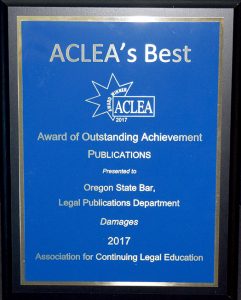OSB Legal Publications has once again been recognized for our commitment to publishing quality legal resources. We received an award for a book we released in 2015.
The Association for Continuing Legal Education (ACLEA) has selected Oregon Real Estate Deskbook as the winner of its ACLEA’s Best Award of Outstanding Achievement in Publications. A plaque commemorating the award was presented at ACLEA’s Annual Meeting in Seattle, Washington in August and is on display in the lobby of the OSB Center.
Of course, Legal Pubs couldn’t have created this highly informative and innovative book without the help of our many volunteer editorial board members (in bold) and authors: Thomas E. Bahrman, Dustin R. Klinger, Andrew I. Davis, Dina E. Alexander, Peter R. Jarvis, Lee Aronson, Patricia A. Ihnat, C. Cleveland Abbe, Dean P. Gisvold, Jonathan M. Radmacher, Michael G. Magnus, Michelle D. Da Rosa, Robert W. Wilkinson, Amy Heverly, Damien R. Hall, Mark A. Manulik, Paul B. Barton, John B. Benazzi, Rebecca S. Schwarzkopf, Don G. Carter , Jeffrey S. Davis, Benjamin Leedy, Thomas S. Hillier, Christopher R. Ambrose, John A. Lusky, Jonathon L. Goodling, Valerie Athena Tomasi, Marisol Ricoy McAllister, Eleanor A. DuBay, Cody Hoesly, Steven A. Moore, Barry L. Groce, Bennett H. Goldstein, Brent Summers, Jason Alexander, Mike G. Halligan, Rich Canaday, Ryan Nisle, James M. Walker, Charles M. Greeff, Mike Silvey, Jeremy Bader, Thomas S. Smith, Kimberly McCullough, Richard Bailey, Robert W. Wilkinson, Jacob A. Zahniser, P. Stephen Russell III, Rebecca Biermann Tom, Howard M. Feuerstein , Steven F. Hill, Hong N. Huynh, Jennie Bricker, David E. Filippi, Kirk B. Maag, Jerry R. Fish, Eric L. Martin, Christopher C. Criglow, Greg Fullem, Richard Allan, Phillip E. Grillo, Lauren E. Johnson, Phillip C. Querin, William D. Miner, Kathleen L. Wilde, Clifton Molatore, Jeanne Kallage Sinnott, David W. Hercher, John Casey Mills, Teresa H. Pearson, William H. Caffee, Ann E. McQuesten, Jim L. Guse, Ronald A. Shellan, Jeneé (Gifford) Hilliard, John H. Gadon, Adam C. Kobos, Eric J. Kodesch, William F. (Fritz) Paulus, Edwin C. Perry, Neil N. Olsen, Sean M. Mazorol, Jill S. Gelineau, Marilyn Moylan Wall, Harold D. Gillis, Alexandra E. Sosnkowski, Robert R. Griffith, Alec J. Shebiel, and Michael H. McGean. Thanks to all of you for your hard work and dedication to this volunteer effort.
For many years, the Oregon State Bar published a loosely related series of real estate books, each published at different times, with different editorial boards, and with a different focus. In addition, we published a book titled Foreclosing Security Interests, which included real estate foreclosure topics.
In late 2012, we assembled a new editorial board interested in a complete reorganization of the series into a comprehensive multi-volume deskbook designed to meet the evolving needs of Oregon real estate attorneys. The editorial board represented a cross-section of the varied practice areas within real estate law. The board members reviewed all of the existing chapters of the real estate series as well as the Foreclosing Security Interests chapters. They identified topics that were covered in different ways in multiple chapters of the existing series and combined them; identified several topics that were no longer relevant and eliminated those chapters; determined that there were 11 additional topics not covered before that needed to be added; and logically organized the 66 chapters based on the order in which they would likely be encountered by the practitioner.
Oregon Real Estate Deskbook was designed to support Oregon attorneys in their role as legal counselor in real estate transactions where nonlawyers are increasingly playing a leading role. Whether the attorney is a recent law grad or a seasoned attorney, there is something in here for them. This publication was made possible only through the extraordinary dedication and gratuitous contribution of time and talent offered by over 90 Oregon attorneys. The accomplished attorneys who drafted each chapter offered their insights—starting with an overview of the particular practice area and drilling down into the most relevant details that practicing attorneys are likely to encounter in their practice. The authors included forms and practice tips where appropriate. They also provided references to other resources, which are often helpful springboards when greater depth of understanding in a nuanced area of the law is necessary.
Oregon Real Estate Deskbook is available on BarBooks™ to all Oregon Bar members or for purchase in print at the Bar’s online bookstore.
